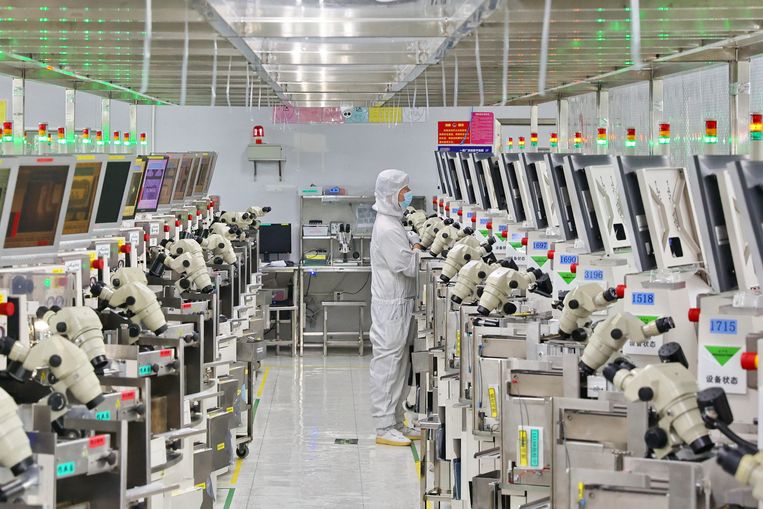For years, it seemed like a given: China will overtake the United States as the world’s largest economy, almost certainly before the end of this decade. But more and more economists are skeptical of this prediction. Chinese growth is slowing, and leader Xi Jinping is pursuing controversial economic policies. This also has consequences for China’s rise as a political and military superpower.
At the end of last month, third-quarter growth numbers of 3.9 percent were well below the annual target of 5.5 percent. The US economy is growing again after two quarters of contraction. For the whole of 2022, growth of 2.8 to 3.2 percent is expected in China, for the United States of 1.5 percent to 2.3 percent.
These non-Chinese declines — after an average annual growth rate of 6.7 percent over the past decade — have prompted many economists to revise an undisputedly long forecast: that China’s gross national product will exceed that of the United States over the next decade. A British and Japanese think tank recently postponed the projected tipping point for a few years: from 2028 to 2030 and 2033 respectively, and other economists say it will never come.
“China is not the first country to want to become the world’s largest economy,” Michael Pettis, a professor of finance at Peking University, said on a program on the Chinese version of Deutsche Welle. In the 1960s, people believed that the Soviet Union would become the largest economy in the world by the 1980s. After that, everyone believed that Japan would overtake the United States in a few decades. But of course nothing came of that.
Decades of extraordinary growth
By itself, a slowdown in growth is a normal phenomenon during China’s transition from a low-wage country to a middle-income economy. China’s miracle growth over the decades has been driven by investments in infrastructure and real estate, which the country has made great strides to catch up with. But this growth model has been put in place. Xi Jinping himself says that he no longer seeks high growth, but “high-quality growth”: based on consumption, export, and high-quality manufacturing.
The bigger problem is that Xi wants to base this shift on questionable economic policy. It interfered so heavily with project developers in 2020 that it sparked a real estate crisis, and increases state interference in the economy to the point that private entrepreneurs are pulling out. In addition, he adheres to the economically disruptive non-proliferation policy. And while China, with its shrinking workforce and rising debt, is already facing structural difficulties.
Xi’s policies are prompting economists to revise their long-term forecasts. According to the Australian research center Lowy Institute, growth to 2050 will be only 2 to 3 percent instead of the 4 to 5 percent projected. The US economy is seen as structurally stronger. “It will, at the very least, roll back the point at which China is overtaking the United States, and increase the possibility that China will never be able to,” the think tank said in a statement. The Wall Street Journal.
According to British research institute Capital Economics, the most likely scenario is that “slow productivity growth and a shrinking workforce will prevent China from catching up with the United States,” said Mark Williams, the institute’s chief economist for Asia.
Bnp racing is a picture problem
In part, the GDP race between China and the United States is an image problem. China is already the world’s largest economy in terms of trade and production, but it lags far behind in terms of GDP per capita. Catching up with the United States in terms of national GDP will be essentially a propaganda battle. “If China slows significantly in its growth, it will affect China’s ability to project its power,” former US Treasury Secretary Lawrence Summers said in a statement. The Wall Street Journal.
But whether or not China becomes No. 1, if it experiences a structural slowdown in growth, that will have geopolitical consequences. With limited resources, the Chinese Communist Party will have to choose between much-needed social services such as health care, elderly care and pension provision, and grand ambitions in national security and industrial policy. A project like the Belt and Road Initiative, an ambitious infrastructure plan along the New Silk Road, could turn out to be prohibitively expensive.
Chinese economists insist that China will overtake the United States. They admit that the tipping point is late, but say it will happen anyway. “Since the outbreak of the epidemic, both China and the United States have faced economic challenges,” said Ma Wei, a researcher at the Institute of American Studies. But the long-term positive trend remains unchanged, and China will take more measures to support the economic recovery. Ma says it is still very likely that China will overtake the United States. “Whether that happens in 2030 or 2035 doesn’t really matter.”







